
Topics
Guests
- Greg Jobin-Leedsauthor of When We Fight, We Win!
- Deymirie Hernándezmember of AgitArte. She is the art director and art curator of the book When We Fight, We Win!
- Jitu Brownnational director of the Journey for Justice Alliance.
- Isabel Sousa-RodriguezPh.D. student at the CUNY Graduate Center and former youth organizer with the Florida Immigrant Coalition.
What do immigration raids and police brutality have in common? They’ve both sparked growing social movements demanding justice. Those linkages are examined in the new book, “When We Fight, We Win!: Twenty-First Century Social Movements and the Activists That Are Transforming Our World.” The book looks at movements ranging from immigration to Black Lives Matter, to the Fight for 15, to LGBTQ rights. We speak with the book’s author, education activist Greg Jobin-Leeds; the book’s art director Deymirie Hernández; and two of the activists featured in the book—Jitu Brown, national director of the Justice Alliance in Chicago, and Isabel Sousa-Rodriguez, Ph.D. student at the CUNY Graduate Center and immigration activist.
Transcript
AMY GOODMAN: This is Democracy Now!, democracynow.org, The War and Peace Report, as we talk about a new book called When We Fight, We Win!: Twenty-First-Century Social Movements and the Activists That Are Transforming Our World. Greg Jobin-Leeds, talk about how you conceived of this book. You’re a longtime education activist and philanthropist.
GREG JOBIN-LEEDS: Thanks, Amy. Both my parents were refugees fleeing war, in a very similar way to Isabel’s story. And I owe my very existence here to their life, because some people stood up and spoke out for them as Jews fleeing Germany.
AMY GOODMAN: Talk about what happened to them there.
GREG JOBIN-LEEDS: So, my father cleaned up the temple after Kristallnacht. My mother was a refugee—
AMY GOODMAN: “Kristallnacht” being?
GREG JOBIN-LEEDS: Being “The Night of Broken Glass,” where the streets were filled with glass, where temples and stores were smashed. And he cleaned up the temple. Luckily, they had an immigration number, and they were able to get in; otherwise, he would have gone the way of Anne Frank, whose family died in the concentration camps. And my mother was a refugee, two times, fleeing war by before she was age 11.
And so these stories that Isabel talks about, and so many, are very personal to me. But people did speak out for them, and that’s why I’m here. But not enough people spoke out. And so, my sense is that we have to be the ones who speak out against these incredible deportations, against the incredible wars that we’re creating. And so, I interviewed brilliant activists, like Isabel, like Jitu Brown, and worked with the most amazing artists, like Dey Hernández, to figure out what are the—what are the key things that activists can do, and what makes movements tick and how to make them more transformative.
AMY GOODMAN: Well, Jitu Brown, you mentioned, we have spoken to, in Chicago, a number of times. And he’s joining us from Chicago right now. Talk about activism and how it is shaping Chicago. I mean, you now have the mayor, Rahm Emanuel, who is under siege. Did I just hear that the Illinois state Legislature is weighing whether to have a recall election?
JITU BROWN: Yes, ma’am. First, good morning, Amy.
AMY GOODMAN: It’s good to have you with us.
JITU BROWN: Thanks for having me. I think what’s inspiring about the organizing that’s really been happening in Chicago over the last few years is that communities that are taught, by design, that there’s no way they can win, that you just have to go with the flow or go along to get along, or accept second- and third-class citizenship, have been fighting back. And in a hypersegregated city like Chicago, you see people struggling together across race, across income levels, so not only in these issues of police violence, but around the issue of public education.
And what’s beautiful is that the fights are no longer just issue-based, which it tends to be sort of what happens. It’s around a shared set of values: What type of world do you want to see? How should policing look in our communities? We will not accept that a normal response for police officers is to shoot down the people that they’re paid to protect—or should be paid to protect. So I think that the work of the young people in this city—BYP 100, Black Lives Matter, Assata’s Daughters—has been really pushing the powers that be to the limit. You know, one of the most—
AMY GOODMAN: And you, like Greg, a longtime education activist. We last spoke to you when you were on hunger strike protesting the closing of a school in a community of color.
JITU BROWN: Yes, ma’am.
AMY GOODMAN: Do you think it is possible Rahm Emanuel will be forced to step down? In the latest killings just last weekend—Quintonio LeGrier, as well as—
JITU BROWN: Bettie Jones.
AMY GOODMAN: —Bettie Jones—you have the police saying they made a mistake when they killed Bettie Jones. She’s the one who opened the door for the police. You don’t hear them saying that with Quintonio LeGrier, whose own father called the police to say, “Help me with my son.”
JITU BROWN: Let’s remember that Mayor Rahm Emanuel closed mental health centers when he first got in office. So, we don’t know if Quintonio had mental health issues, but if you have someone who is struggling, the response should not be to kill them. The response should be to be able to bring that person down in a way that’s humane, a way that can get them treatment that they deserve, or if they need to be incarcerated, that they can make that happen. But the response should not be to shoot them seven times. To shoot them seven times. And you don’t hear any sense that—from the police, that that’s outrageous.
So I think what you see is that it’s a part of Chicago culture, that has really just accelerated under Mayor Rahm Emanuel. The privatization of schools has accelerated under Mayor Rahm Emanuel. So, I believe that he is in danger. I think that he is fighting for his political life. And I think he deserves it. I think that his lack of willingness to look at people in our neighborhoods as valuable, as people that can actually make a contribution to Chicago, is racist, is arrogant. It has caused pain and suffering in people’s lives. People have it harder than they did before he came into office. And, you know, that should not be acceptable.
You know, we don’t envision a world—we don’t have some unrealistic view of a colorblind society, but we should have a colorful society. We should have a society where I shouldn’t have to apologize for being who God made me. I shouldn’t have to act as if I’m not proud to be black, and still be able to work with Greg Jobin-Leeds, still be able to work with Dey Hernández, as brothers and sisters who respect what we each bring to the table. That’s the world we’re fighting for. And that’s not the—
AMY GOODMAN: Before—
JITU BROWN: That’s not the city or the world that he comes from.
AMY GOODMAN: Before we end, I want to bring Dey Hernández into this conversation, with AgitArte, which is like AgitArt in English. You collaborated in When We Fight, We Win! in a most magnificent way. I mean, this book is unique in the way it is framed by the art. Describe why this is so important and some of these images in your book.
DEYMIRIE HERNÁNDEZ: In the recognition of art and culture as an essential part of building the movement, we, AgitArte—AgitArte is an organization where I’m a resident artist. And AgitArte is an organization made up of artists who are committed to creating projects and practices of culture, of solidarity with workers and marginalized communities in grassroots struggles. And our work in When We Fight, We Win! was definitely creating that art narrative, recognizing that most of—and we forget that the narratives are controlled by those in power and that there’s certainly art and culture created within the communities, of amazing souls and amazing artists who, hand by hand with activists, are changing those narratives and creating a new culture, where we can create that liberation or freedom.
AMY GOODMAN: One of the people you collaborated with also made one of the big Bread and Puppet-like art pieces in the climate justice march. Describe that, of Mother Earth.
DEYMIRIE HERNÁNDEZ: Yeah.
AMY GOODMAN: That became the image of the march.
DEYMIRIE HERNÁNDEZ: So, that one, in particular, we created with El Puente, with El CADRE, folks from El Puente in Brooklyn, also an organization that’s been based for more than 40 years in Los Sures. And the big—the giant puppet, more than 14 feet—and it’s actually our biggest puppet—was created in, I would say, like two weeks. And we wanted the face of—we were thinking of the Pachamama, so a resemblance of Mother Earth, but also a resemblance of all the single mothers and brown and black bodies that are raising, mm-hmm, children.
AMY GOODMAN: Well, before we go, Greg, you’re traveling the country now. Tonight you’re going to be premiering, launching the book at Powerhouse Arena in Brooklyn, in DUMBO, a big multimedia display, art, stories. And where do you go from here, from Brooklyn to Boston?
GREG JOBIN-LEEDS: So, 7:00 p.m. tonight at Powerhouse. We’ll be in Cambridge on Thursday at 7:00 p.m. at Harvard Books. We’ll be in D.C. at Busboys and Poets at—on Tuesday the 12th. We’re back in Boston. Then we go to Chicago, Seattle, Portland and—
AMY GOODMAN: Your website is?
GREG JOBIN-LEEDS: When We Fight, We Win. WhenWeFightWeWin.org. And—
AMY GOODMAN: As you bring together movements all over this country once again, the very movements you documented. I want to thank you all for being with us, Greg Jobin-Leeds, Dey Hernández, Jitu Brown in Chicago and Isabel Sousa-Rodriguez. Best of luck on your journey. The book, again, When We Fight, We Win!: Twenty-First-Century Social Movements and the Activists That Are Transforming Our World.

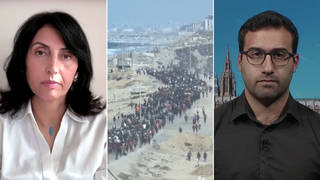
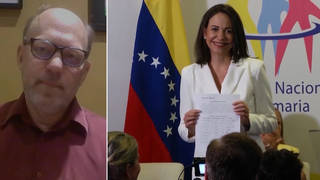
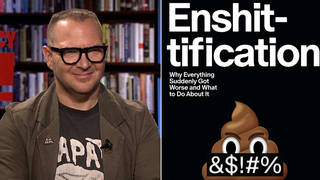





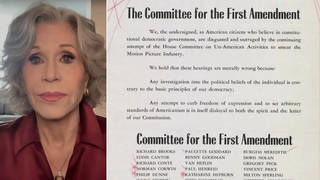
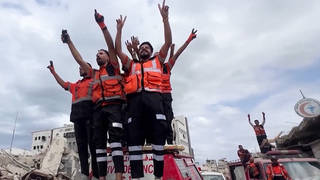
Media Options